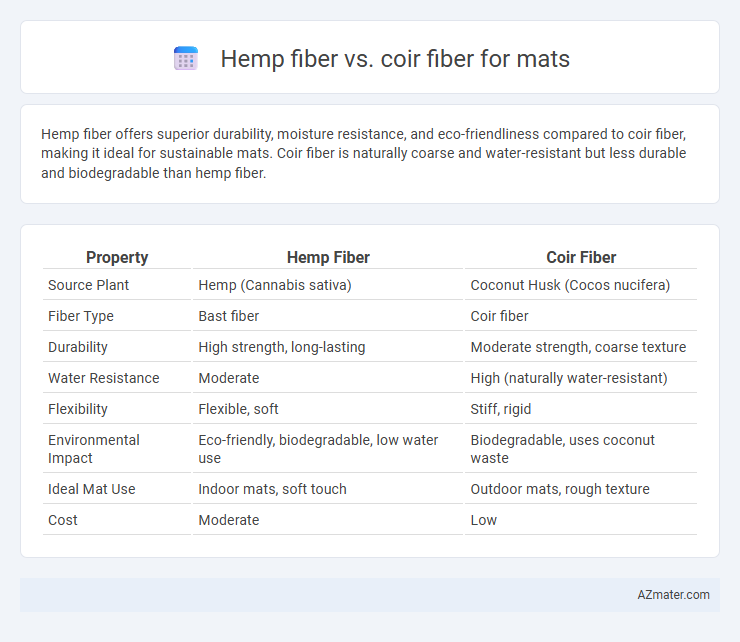Hemp fiber offers superior durability, moisture resistance, and eco-friendliness compared to coir fiber, making it ideal for sustainable mats. Coir fiber is naturally coarse and water-resistant but less durable and biodegradable than hemp fiber.
Table of Comparison
| Property | Hemp Fiber | Coir Fiber |
|---|---|---|
| Source Plant | Hemp (Cannabis sativa) | Coconut Husk (Cocos nucifera) |
| Fiber Type | Bast fiber | Coir fiber |
| Durability | High strength, long-lasting | Moderate strength, coarse texture |
| Water Resistance | Moderate | High (naturally water-resistant) |
| Flexibility | Flexible, soft | Stiff, rigid |
| Environmental Impact | Eco-friendly, biodegradable, low water use | Biodegradable, uses coconut waste |
| Ideal Mat Use | Indoor mats, soft touch | Outdoor mats, rough texture |
| Cost | Moderate | Low |
Introduction to Hemp Fiber and Coir Fiber
Hemp fiber, derived from the stalk of the Cannabis sativa plant, is renowned for its strength, durability, and eco-friendly properties, making it an excellent choice for mats that require longevity and biodegradability. Coir fiber, extracted from coconut husks, is valued for its coarse texture, water resistance, and natural rigidity, commonly used in mats designed for heavy-duty use and moisture-prone environments. Both fibers offer sustainable alternatives to synthetic materials, with hemp providing a softer, more resilient mat surface and coir delivering robust, abrasive qualities suitable for outdoor applications.
Sourcing and Sustainability of Hemp vs Coir
Hemp fiber is sourced from the stalks of the Cannabis sativa plant, known for rapid growth and minimal pesticide requirements, making it a highly sustainable crop with low environmental impact. In contrast, coir fiber is derived from the outer husk of coconut shells, a byproduct of coconut harvesting, promoting waste utilization but dependent on tropical regions and less rapid regeneration compared to hemp. Hemp's efficient land use and biodegradability position it as a more carbon-neutral option, while coir supports circular economy practices through agricultural waste reuse, yet involves longer processing times and potential chemical treatments.
Physical Properties: Strength, Texture, and Durability
Hemp fiber exhibits superior tensile strength, making it highly durable and resistant to wear, while its coarse but smooth texture provides a comfortable feel for mats. Coir fiber, derived from coconut husks, offers excellent rigidity and natural water resistance but has a rougher, more abrasive texture compared to hemp. Durability in coir is enhanced by its ability to withstand moisture and heavy foot traffic, whereas hemp mats excel in longevity under dry conditions with minimal fraying.
Environmental Impact: Hemp vs Coir Fiber Production
Hemp fiber production generates significantly less environmental pollution compared to coir fiber processing, as hemp cultivation requires fewer pesticides and fertilizers while promoting soil health through crop rotation. Coir fiber extraction involves soaking coconut husks in water for extended periods, which can lead to water contamination and higher water usage. Hemp's rapid growth and carbon sequestration capabilities make it a more sustainable raw material with a lower overall carbon footprint than coir fiber.
Cost Comparison: Hemp Mats vs Coir Mats
Hemp fiber mats generally cost more than coir fiber mats due to higher cultivation and processing expenses associated with hemp. Coir mats, made from coconut husk fibers, offer a more affordable option with competitive durability and natural water resistance. Price differences reflect varying sourcing methods and sustainable practices, making coir a budget-friendly choice while hemp provides enhanced strength and longevity.
Water Absorption and Retention Capabilities
Hemp fiber exhibits high water absorption and retention capabilities, making it ideal for mats that require moisture management and quick drying. In contrast, coir fiber has moderate water absorption but retains water longer due to its dense and coarse structure, which enhances durability and resistance to mold. Hemp mats are preferred for environments demanding breathability and moisture control, whereas coir mats excel in outdoor settings with prolonged exposure to moisture.
Biodegradability and Eco-Friendliness
Hemp fiber exhibits superior biodegradability compared to coir fiber, breaking down naturally within a few months due to its cellulose-rich structure, making it highly eco-friendly. Coir fiber, derived from coconut husks, is also biodegradable but decomposes more slowly because of its higher lignin content, which increases durability but reduces environmental breakdown speed. Both fibers are sustainable options for mats, yet hemp's rapid biodegradability and lower environmental impact position it as a preferable choice for eco-conscious consumers.
Applications and Uses in Mat Manufacturing
Hemp fiber offers exceptional durability and moisture resistance, making it ideal for eco-friendly mats used in automotive interiors, doormats, and floor coverings that require long-lasting performance. Coir fiber, derived from coconut husks, is highly valued for its natural stiffness and water-resistant properties, commonly employed in entrance mats, doormats, and heavy-duty outdoor mats to trap dirt and provide excellent abrasion resistance. Both fibers contribute to sustainable mat manufacturing by enhancing biodegradability and minimizing environmental impact in a variety of residential and commercial applications.
Consumer Preferences and Market Trends
Hemp fiber for mats is preferred by consumers seeking eco-friendly, durable, and lightweight options, owing to its high tensile strength and natural resistance to mold and UV damage. Coir fiber, derived from coconut husks, remains popular in markets favoring rustic texture and water resistance, often chosen for doormats and outdoor use due to its coarse, rough surface. Market trends indicate a growing demand for sustainably sourced hemp mats driven by increased environmental awareness, while coir continues to hold steady in traditional sectors with stable supply chains.
Conclusion: Which Fiber is Superior for Mats?
Hemp fiber offers superior durability, moisture resistance, and eco-friendliness compared to coir fiber, making it ideal for high-quality, long-lasting mats. Coir fiber excels in natural water absorption and is more affordable, but its brittleness limits its lifespan. For sustainable and resilient mats, hemp fiber stands out as the superior choice.

Infographic: Hemp fiber vs Coir fiber for Mat
 azmater.com
azmater.com